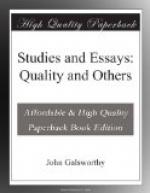But his most passionate delight was swimming in anything except the sea, for which, with its unpleasant noise and habit of tasting salt, he had little affection. I see him now, cleaving the Serpentine, with his air of “the world well lost,” striving to reach my stick before it had touched water. Being only a large spaniel, too small for mere heroism, he saved no lives in the water but his own—and that, on one occasion, before our very eyes, from a dark trout stream, which was trying to wash him down into a black hole among the boulders.
The call of the wild-Spring running—whatever it is—that besets men and dogs, seldom attained full mastery over him; but one could often see it struggling against his devotion to the scent of us, and, watching that dumb contest, I have time and again wondered how far this civilisation of ours was justifiably imposed on him; how far the love for us that we had so carefully implanted could ever replace in him the satisfaction of his primitive wild yearnings: He was like a man, naturally polygamous, married to one loved woman.
It was surely not for nothing that Rover is dog’s most common name, and would be ours, but for our too tenacious fear of losing something, to admit, even to ourselves, that we are hankering. There was a man who said: Strange that two such queerly opposite qualities as courage and hypocrisy are the leading characteristics of the Anglo-Saxon! But is not hypocrisy just a product of tenacity, which is again the lower part of courage? Is not hypocrisy but an active sense of property in one’s good name, the clutching close of respectability at any price, the feeling that one must not part, even at the cost of truth, with what he has sweated so to gain? And so we Anglo-Saxons will not answer to the name of Rover, and treat our dogs so that they, too, hardly know their natures.
The history of his one wandering, for which no respectable reason can be assigned, will never, of course, be known. It was in London, of an October evening, when we were told he had slipped out and was not anywhere. Then began those four distressful hours of searching for that black needle n that blacker bundle of hay. Hours of real dismay and suffering for it is suffering, indeed, to feel a loved thing swallowed up in that hopeless haze of London streets. Stolen or run over? Which was worst? The neighbouring police stations visited, the Dog’s Home notified, an order of five hundred “Lost Dog” bills placed in the printer’s hands, the streets patrolled! And then, in a lull snatched for food, and still endeavouring to preserve some aspect of assurance, we heard the bark which meant: “Here is a door I cannot open!” We hurried forth, and there he was on the top doorstep—busy, unashamed, giving no explanations, asking for his supper; and very shortly after him came his five hundred “Lost Dog” bills. Long I sat looking at him that night after my companion had gone up, thinking of the evening, some years before, when there followed as that shadow of a spaniel who had been lost for eleven days. And my heart turned over within me. But he! He was asleep, for he knew not remorse.




